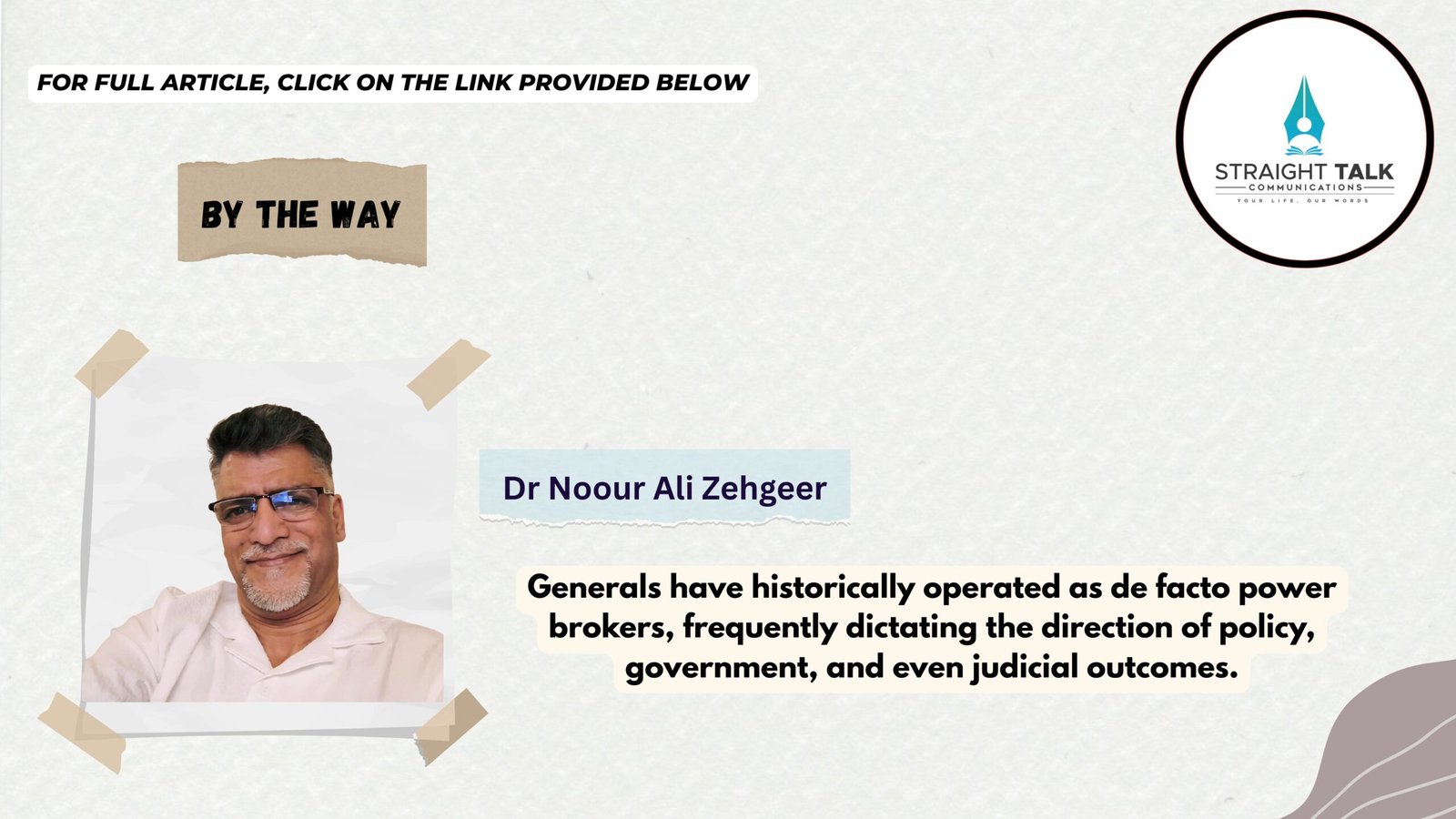Military Dominance and Civilian Struggles in Pakistan

Generals have historically operated as de facto power brokers, frequently dictating the direction of policy, government, and even judicial outcomes.
Dr. Noour Ali Zehgeer
Pakistan once known for Hockey and Cricket, has gone to the stage where everyone is accusing this country for nurturing terrorism across the world. It is the only country which got benefitted with conflicts in Afghanistan as they received billions for providing the support to USA. This country has lost many presidents and prime ministers to terrorism but still keeps supporting this mindset in other countries. While supporting the USA they learnt the art of destabilising their neighbours especially INDIA. The country is tagged as an epicentre of terrorist activities across the world. Needless to mention that most wanted people in the world are living in Pakistan. People may disagree with me, but the truth is people wanted in US and India for driving terrorism in these countries are given shelter by Pakistan, although they blatantly deny this.
As Pakistan battles an intensifying political crisis and a faltering economy, the recent elevation of General Asim Munir to the rank of Field Marshal has further complicated the nation’s already precarious situation. This rare military promotion not only consolidates Munir’s authority but also underscores the entrenched dominance of the armed forces in Pakistan’s governance — a pattern that continues to undermine democratic norms.
General Munir’s promotion is more than symbolic. It marks the military’s undisputed control over state matters and sends a clear message to both domestic actors and the international community. Pakistan has long been a country where the military plays a central role in political affairs — often stepping beyond its constitutional mandate. Generals have historically operated as de facto power brokers, frequently dictating the direction of policy, government, and even judicial outcomes.
Munir’s stature has grown substantially following his confrontation with India and his diplomatic interactions abroad, including a notable meeting with former US President Donald Trump. These engagements elevated his image as a central figure in Pakistan’s strategic posture. Yet his rise comes at a moment when the country is buckling under inflation, dwindling economic opportunities, political instability, and the blowback of years of militant patronage. Meanwhile, the political environment remains fragmented and unstable. A recent ruling by Pakistan’s Supreme Court under Chief Justice Faez Isa invalidated the electoral legitimacy of the Pakistan Tehreek-e-Insaf (PTI) party in the 2024 elections. Citing procedural violations and symbol misuse, the verdict effectively dismantled Imran Khan’s political base and further polarized the landscape.
Imran Khan, still imprisoned, continues to act as a lightning rod for opposition to the military’s grip on power. Despite internal divisions within PTI, many still view him as the symbol of civilian defiance. However, without a cohesive alliance among opposition forces, efforts to challenge the ruling establishment have been largely ineffective.
This political vacuum has allowed the Pakistan Muslim League-Nawaz (PML-N) and the Pakistan People’s Party (PPP) to tighten their hold on the National Assembly. Yet the legitimacy of this dominance is under question, as voter confidence in democratic institutions reaches new lows. Public frustration grows as political infighting overshadows urgent issues like inflation, unemployment, and healthcare.
Economically, Pakistan is on the edge. Foreign debt continues to balloon, foreign exchange reserves are critically low, and inflation remains unchecked. The government’s reliance on IMF assistance has offered only temporary relief, failing to address deeper structural deficiencies in taxation, industrial growth, and energy policy. Economic stagnation has eroded middle-class stability and pushed millions further into poverty.
Despite commanding widespread loyalty within the military and bureaucracy, Munir cannot afford to overlook growing public resentment. The widening gulf between the state and the citizenry, amplified by repression and economic despair, could lead to widespread unrest. The military’s traditional reliance on force may prove counterproductive if civil dissent erupts at scale.
On the security front, unrest in Balochistan and Khyber Pakhtunkhwa continues to pose severe challenges. There are also reports of internal dissent within the ranks of the military, stemming from dissatisfaction over the handling of regional and ethnic grievances. These fissures reveal the limitations of centralized military control in a nation with complex social and cultural fault lines.
Internationally, Pakistan’s image remains tarnished. Diplomatic efforts, including Munir’s engagement with foreign leaders, have yielded some symbolic wins. However, meaningful economic partnerships and investments demand political stability, transparency, and long-term security — qualities that Pakistan currently lacks. Western allies remain wary of Pakistan’s mixed track record on counterterrorism, while even China, its traditional partner, appears increasingly cautious about its Belt and Road investments under the CPEC initiative.
Freedom of expression has also suffered under the current regime. Journalists have been harassed or silenced, dissent has been criminalized, and independent media outlets face mounting pressures. Civil society is being steadily suffocated. With key political leaders jailed and courts viewed as extensions of the establishment, hopes for democratic renewal remain bleak.
Yet, amid the gloom, there are faint glimmers of reconciliation. Some figures, including President Asif Ali Zardari and senior PPP leaders, have called for a broad-based dialogue involving all major institutions — the judiciary, military, political parties, and civil society. Such calls, if heeded sincerely, could help ease tensions and chart a more inclusive future.
In conclusion, General Asim Munir’s elevation to Field Marshal is a significant milestone — not just for the military, but for the country’s political trajectory. While his rise may appear stabilizing to some, it also reflects the deepening militarization of governance. If Pakistan is to emerge from this prolonged crisis, it must initiate bold reforms, reduce military interference, strengthen democratic institutions, and place its citizens at the center of national policymaking. The decisions taken now will shape Pakistan’s destiny for generations to come.
(The views are of the author and not that of Straight Talk Communications)







